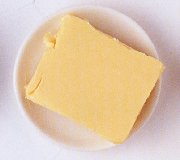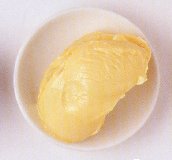Margarine
http://www.100md.com
《e Natural Health Center》
 |
 |
 |
Eggs, Milk
Margarine
Latin:
Origin:
Margarine was invented by a French chemist as a cheap butter substitute in the 1860s, when it was made with beef suet and skimmed milk. Today's margarine is far more sophisticated and highly processed. Vegetable oils are used either on their own or combined with animal fats or fish oils. Margarine also usually contains water, whey, emulsifiers to bind the oil and liquids, salt, coloring and flavoring agents.
, 百拇医药
By law margarine must be fortified with vitamins A and D--which occur naturally in butter. Vitamin A plays a vital role in good vision and healthy skin and is an important antioxidant, while vitamin D helps the body to absorb calcium, which is needed for healthy bones and teeth.
The debate over whether butter or margarine is healthier has raged for years. Many nutritionists now say butter is better - as long as it is eaten in moderation. Butter is certainly a more natural product than margarine which relies heavily on colorings and other additives to turn it from a greyish, unappealing spread into the more familiar finished product.
, 百拇医药
Usually butter and margarine have the same total fat content and provide the same amount of energy (typically 81 percent fat and 740 calories per 100 g), although some margarine manufacturers have lowered the fat in their product to 70 percent (635 calories per 100 g).
In the manufacture of margarine, liquid oils are converted into a solid spread by a chemical process called hydrogenation. As well as hardening the oils, the process changes their chemical structure, turning some of the unsaturated fatty acids into trans fatty acids--a less healthy form of polyunsaturates that have much the same effect on the body as saturated fats. They raise the levels of cholesterol and research now indicates that trans fats are linked to heart disease.
, 百拇医药
Some margarine companies have reformulated their products in order to reduce their trans fat content. Soft margarines labelled 'high in polyunsaturates' contain considerably less saturated fats and trans fatty acids than other types of margarine and butter and are good sources of vitamin E. However, recent research is beginning to suggest that high intakes of polyunsaturated oils may predispose some people to asthma.
Low-fat spreads are made mainly from water and whipped butter or vegetable oils; the proportions of saturated fats vary, so check the labels carefully. Low-fat spreads usually contain 40 percent fat and around 390 calories per 100 g, and very low-fat spreads contain about 25 percent fat and 270 calories per 100 g. Some spreads are as low as 5 percent fat. These are made with fat substitutes, such as whey protein, that imitate the texture of fat. Their high water content makes them unsuitable for cooking and they often contain gelatine, and so are unsuitable for vegetarians.
, 百拇医药
Many people prefer the taste of butter to other spreads, but have been discouraged from buying it because it is high in saturated fat and cholesterol. However, many nutritionists believe that, as long as it is not eaten to excess, butter can be preferable to margarine as it is a relatively natural product.
Generally, all yellow spreads should be used in moderation. If you buy specialty breads that taste interesting in their own right, you can dispense with spreads altogether.
, 百拇医药
Properties:
Functions:
Applications:
Dosage and Administration:
Used as spread on bread. It makes food more palatable.
Cautions on Use:
High in calories, unless it is a low-fat spread. Hard margarine is high in saturated fat.
, 百拇医药
Reference Materials:
Toxic or Side Effects:
Modern Researches:
Every 100 g of hard margarine contains 740 calories, 81 g of fats, of which 36 g is saturated fat, 33 g monounsaturated fat, 9 g polyunsaturated fat, and 9-14 g trans fats; there are also 790 ug vitamin A, 7.94 ug vitamin D and 8 mg vitamin E.
Every 100 g of soft (polyunsaturated) margarine contains 740 calories, 81 g of fats, of which 16 g is saturated fat, 21 g monounsaturated fat, 41 g polyunsaturated fat, and 0.7-6 g trans fats; there are also 900 ug vitamin A, 7.94 ug vitamin D and 8 mg vitamin E., 百拇医药